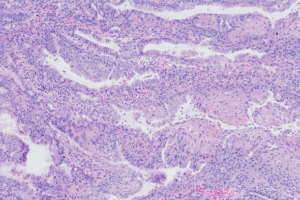Oncology
Endometrial Cancer
The Role of Neoadjuvant Therapy for Advanced Endometrial Cancer
Although there have been very well-designed, randomized, phase 3 trials studying neoadjuvant therapy for advanced ovarian cancer, we have not done the same thing for endometrial cancer. Historically, we considered disease spread outside the uterus to be stage IVB and incurable. However, the development of new treatment regimens for advanced/metastatic endometrial cancer (including immunotherapy, for example) has improved outcomes and response to treatment and has allowed for unresectable disease to become resectable in some cases and possibly even cured. Additionally, with the 2023 International Federation of Gynecology and Obstetrics (FIGO) staging system, pelvic metastases are now considered stage III. Currently, only extrapelvic spread is considered stage IV.
<br>
When we think about using neoadjuvant therapy, we first determine whether the patient can safely undergo surgery. If the patient is fit for surgery and has liver or lung metastases, especially in multiple locations, going straight to surgery without neoadjuvant therapy means that these metastases would be left behind, resulting in a suboptimal surgery. In addition, there would be a delay in the patient receiving chemotherapy while they recover from surgery and any resulting complications. So, unless liver or lung metastases resolve, you are likely not going to perform surgery. In patients who receive neoadjuvant chemotherapy and whose metastases clear, we consider surgery. Neoadjuvant therapy can also inform us about the biological behavior of the cancer, which will help determine whether surgery is in the best interest of the patient.
<br>
Sometimes patients have unresectable pelvic disease that behaves like stage IIIB cervical cancer, with cervical and sometimes vaginal extensions, vaginal drop metastases, or pelvic sidewall involvement. You cannot resect the primary disease in these patients, so your choices are using neoadjuvant therapy with chemotherapy or using radiation similar to how we use it for cervical cancer. In pelvis-confined, advanced endometrial cancer, with the different chemotherapy regimens available, I see a trend toward using neoadjuvant chemotherapy and then either performing surgery, radiating, or doing some combination of those, depending on the amount of tumor shrinkage achieved with neoadjuvant chemotherapy.
<br>
I think that the key takeaway is to allow the patient and the distribution of their endometrial cancer to guide neoadjuvant treatment. Yes, we want to do surgery if we can get a complete resection, but we also need to be flexible as to when surgery occurs. It does not have to be after 3 cycles. It is most important that we get distant disease controlled and that we do not expose patients to surgery too early, to where disease in the lung or liver could start progressing right after surgery. We definitely want to have the disease controlled before considering surgery.
Berek JS, Matias-Guiu X, Creutzberg C, et al; Endometrial Cancer Staging Subcommittee, FIGO Women’s Cancer Committee. FIGO staging of endometrial cancer: 2023. Int J Gynaecol Obstet. 2023;162(2):383-394. Published correction appears in Int J Gynaecol Obstet. 2024;166(3):1374.
<br>
Bogani G, Ditto A, Leone Roberti Maggiore U, et al. Neoadjuvant chemotherapy followed by interval debulking surgery for unresectable stage IVB serous endometrial cancer. Tumori. 2019;105(1):92-97. doi:10.1177/0300891618784785
<br>
Brodeur MN, Samouëlian V, Dabi Y, Cormier B, Beauchemin MC, Barkati M. Neoadjuvant radiotherapy and brachytherapy in endometrial cancer with gross cervical involvement: a CHIRENDO research group study. Int J Gynecol Cancer. 2021;31(1):78-84. doi:10.1136/ijgc-2020-001797
<br>
Lim H, Bang SH, Kim Y, et al. Clinical implications of neoadjuvant chemotherapy in advanced endometrial cancer: a multi-center retrospective cohort study. BMC Cancer. 2022;22(1):703. doi:10.1186/s12885-022-09746-3
<br>
Nakanishi T, Saito T, Aoki D, et al. JGOG2046: a feasibility study of neoadjuvant chemotherapy followed by debulking surgery for clinically diagnosed FIGO stage IVb endometrial cancer. Int J Clin Oncol. 2023;28(3):436-444. doi:10.1007/s10147-022-02284-9
<br>
Ronsini C, Iavarone I, Carotenuto A, et al. Now or later? The role of neoadjuvant treatment in advanced endometrial cancer: a systematic review. Healthcare (Basel). 2024;12(23):2404. doi:10.3390/healthcare12232404
<br>
Tobias CJ, Chen L, Melamed A, et al. Association of neoadjuvant chemotherapy with overall survival in women with metastatic endometrial cancer. JAMA Netw Open. 2020;3(12):e2028612. doi:10.1001/jamanetworkopen.2020.28612
<br>
Vargo JA, Boisen MM, Comerci JT, et al. Neoadjuvant radiotherapy with or without chemotherapy followed by extrafascial hysterectomy for locally advanced endometrial cancer clinically extending to the cervix or parametria. Gynecol Oncol. 2014;135(2):190-195. doi:10.1016/j.ygyno.2014.09.001
<br>
Vergote I, Coens C, Nankivell M, et al; EORTC, MRC CHORUS Study Investigators. Neoadjuvant chemotherapy versus debulking surgery in advanced tubo-ovarian cancers: pooled analysis of individual patient data from the EORTC 55971 and CHORUS trials. Lancet Oncol. 2018;19(12):1680-1687. Published correction appears in Lancet Oncol. 2019;20(1):e10.
<br>
Wright JD, Huang Y, Melamed A, et al. Use and outcomes of neoadjuvant chemotherapy for metastatic uterine cancer. Gynecol Oncol. 2021;162(3):599-605. doi:10.1016/j.ygyno.2021.06.016











